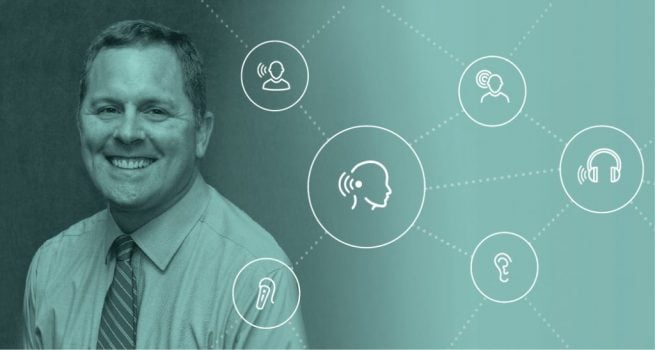Hipper Hearing

Kevin Franck, MSE ’95, is on a mission to help the world hear better—and that starts, he says, “by changing the perception of everyone around us.”
“Until it’s as natural—and perhaps fashionable—to use devices to help you hear as it is to use glasses to help you see, we’ll need to show off our hearing devices and demonstrate how they integrate into our modern digital lifestyle rather than hide them,” notes Franck, director of audiology at Massachusetts Eye and Ear and a faculty member at Harvard Medical School, where he leads a department of more than 40 audiologists.
Franck also works with nonprofit organizations, such as the Hearing Loss Association of America, that advocate for better hearing and companies that create a wide range of hearing assistance products in his efforts to improve access for people with hearing impairments.
Currently, only a small fraction of people who could benefit from hearing devices and other assistive listening technologies use them. “We need to change the way we do business,” he says.
Today’s wide range of clinical hearing devices—hearing aids, as well as devices that transmit sound through the body or interface with the hearing nerve directly—are more effective and easier to use than ever before, and the advent of “hearables” (much cheaper than traditional hearing aids because they don’t require professional services) can help change perceptions, Franck predicts. “We’ll sell hearing devices that make you feel young because of what you will be able to do with them.”
Much of Franck’s career has focused on helping those with hearing loss help themselves. For example, while earning his MBA at the University of Pennsylvania, Franck filed to protect the intellectual property of a system aimed at helping patients program their own cochlear implants. That work caught the attention of Cochlear Limited, which recruited him to run its global software marketing division from Sydney, Australia, for four years.
Later he and others formalized a startup called Ear Machine, creating an algorithm that allowed people with hearing loss to adjust their hearing aids as well as an audiologist could. Once Bose Corporation bought this technology, Franck led marketing for the Bose Hear Emerging Business, which focused on developing hearing tools, and helped launch its first product based on this technology. Soon, a new law will make these devices exempt from state dispensing regulations to help people with more simple hearing needs.
“By both helping companies reach self-sufficient patients with hearing loss more directly, and improving access to those who need our clinical services” says Franck, “we’ll help a far larger group of people enjoy better hearing.”
